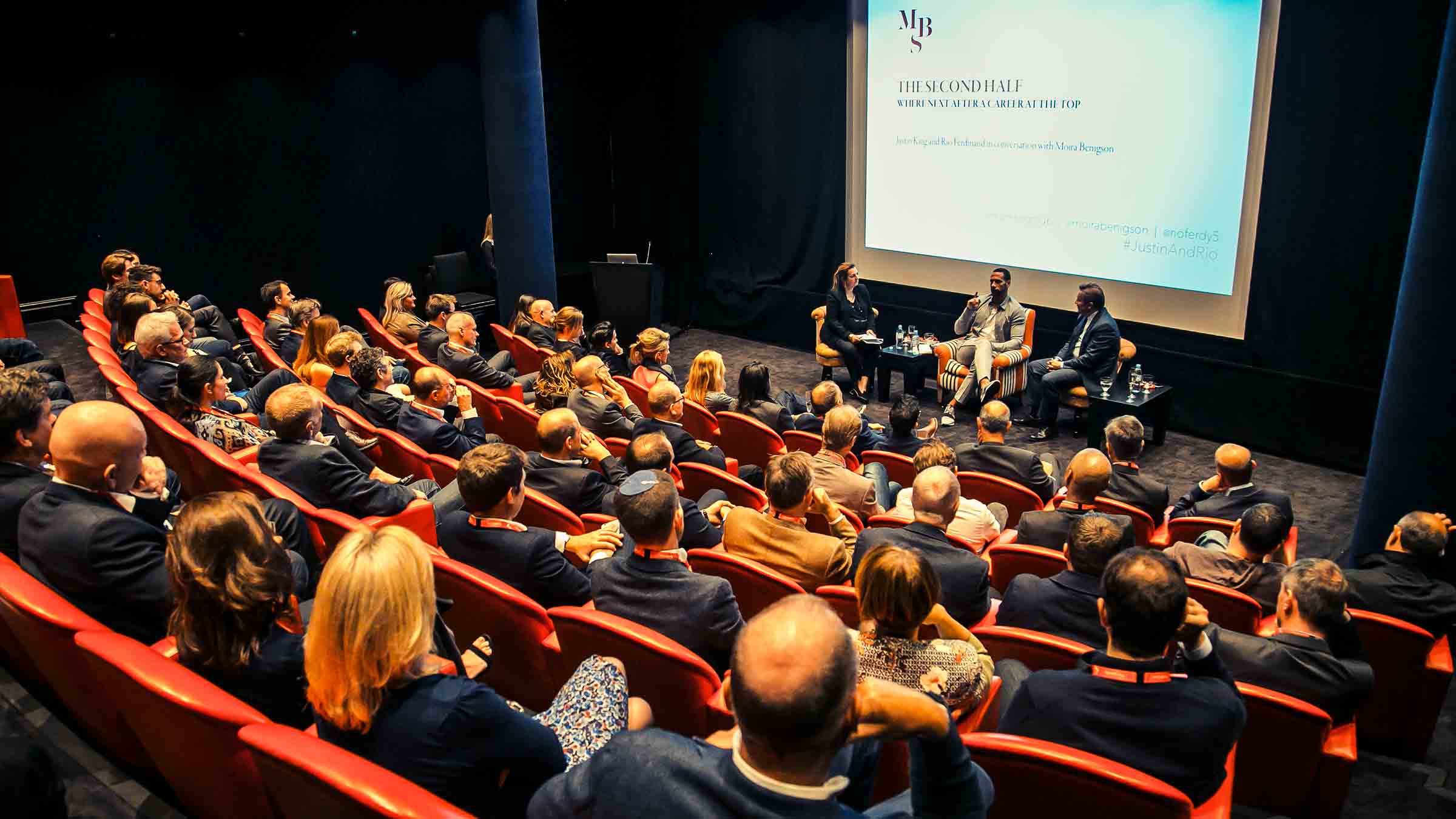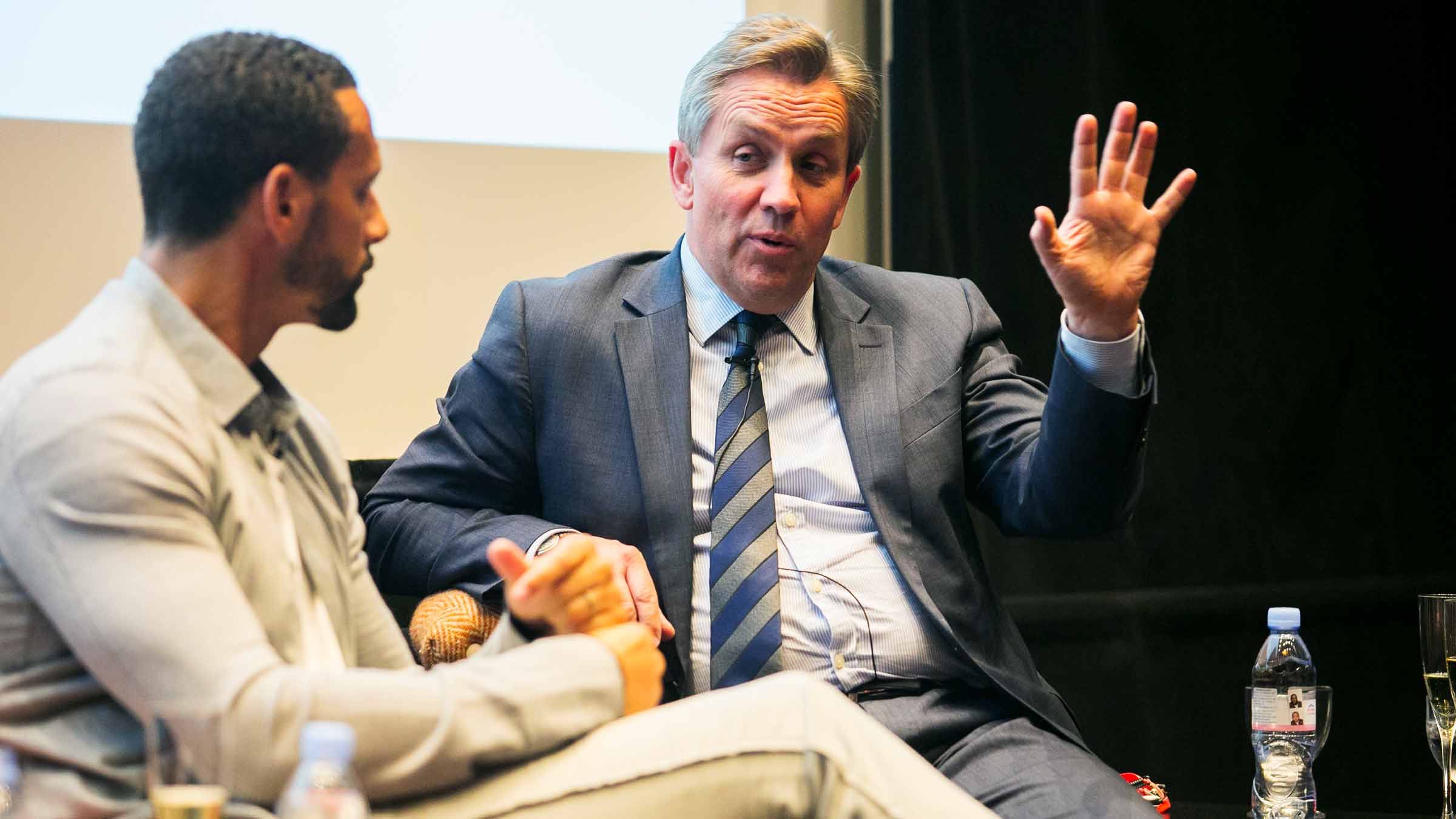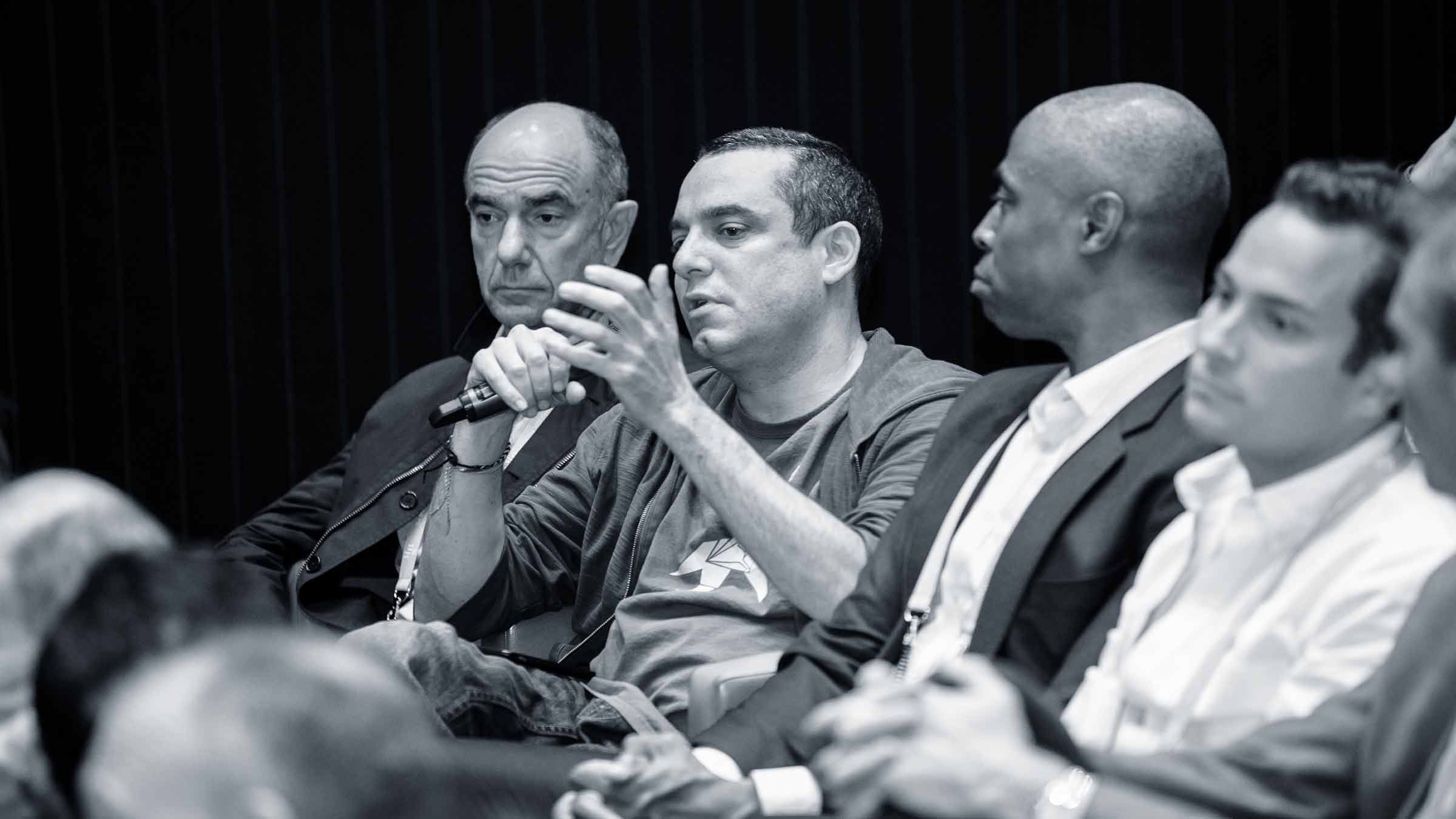On a rainy Wednesday evening at London’s Soho Hotel, the screening room is filling up with an audience of 75, populated by CEOs and chairmen across retail, consumer products, fashion, digital and leisure, alongside investors and opinion-formers, including Saul Klein, Imran Amed and former Olympics Minister Tessa Jowell. We’re gathering to discuss ‘The Second Half’ with Justin King and Rio Ferdinand.
I kick off the discussion by explaining that over the past 30 years, I’ve been fortunate to interview thousands of leaders and executives across a diverse range of brands, businesses and organisations. I have worked with and for some of the outstanding talent the consumer industries have to offer and I have come to learn the difference between good and great. Most people do not try to reinvent their careers, as even the very best tend to be relatively risk-averse. So, in bringing together Justin and Rio, I hope to uncover not only the remarkable similarities between the two men but also what has motivated them to go bold after a career at the top.
My aim is to unpack the attributes that have made them both rise to the top of their game, to find out what has given them the strength and self-belief to reinvent themselves. What I really want to understand is what’s driving them to keep pushing when either could opt for an easy life.
I open up the discussion by asking Justin and Rio to describe the defining moments of their careers. It was remarkable how similar their answers were. For Rio, winning the Champions League in Moscow was a clear highlight: “I was fortunate to join Manchester United, but I hadn’t won anything before that. I’d been playing for 6 or 7 years, but hadn’t got near winning anything. And then I joined Manchester United and went into a dressing room with the likes of Ryan Giggs, Roy Keane, Paul Scholes and Gary Neville. They all had several medals; I had zero. That was a big moment for me. I had to really look around and absorb their knowledge, be a sponge, and pick out what I could take from the other guys to refine my game, refine the way I approached football, training and the Manchester United work ethic. After all of that, getting to Moscow was getting to the top of the mountain – it’s the hardest competition to win and you think you’re never going to get there. Getting over the line and winning it was a moment of satisfaction.”
‘I had to really look around and absorb their knowledge, be a sponge, and pick out what I could take from the other guys to refine my game, refine the way I approached football’ – Rio Ferdinand
Meanwhile for Justin, who’d had to give up on his own early dreams of being a footballer (both agreed they’d have loved to have had each other’s careers) after a significantly broken leg aged 16, arriving at the Mars graduate programme was similarly defining: “Mars has become famous for the quality of the people it recruited but also the training and development it afforded graduates, and I remember very clearly looking around the room and thinking this is the first time I’ve sat in a room of people who are truly my equals – and probably a few of them quite a bit better than me. And that competitive streak in me was an important part of everything that I do – being the best I can be, but also beating the other guy was quite important.”
‘I do take pleasure in what I achieve, but it’s momentary and passing; it’s pocketing the last success and immediately moving on to the next challenge’ – Justin King
For both, winning and attaining goals has clearly been an obsession. Once a goal is reached, it’s time to focus on the next. “I do take pleasure in what I achieve, but it’s momentary and passing; it’s pocketing the last success and immediately moving on to the next challenge,” says Justin. Even the very night Rio was celebrating the Champions League victory he now highlights as a defining moment in his career, he tells us how he pulled Manchester United CEO David Gill aside to say, “Listen, I had a good night but who are we getting next? Who are we buying for next season?”
Rio’s obsession with the detail and looking forward, constantly improving, led him to be one of the first sportsmen to really grasp the power of social media. Fellow players in the dressing room couldn’t understand why he was interested in the early days, but he could see how much he’d have liked it as a young sports fan himself and spied an opportunity to get closer to those people – “not to shape myself, but to tell people about the real me… I quickly saw it was an area I could manage and it enabled me to really think about the future a lot more. I thought I’m talking to the people I’ll hopefully be able to talk to in 5 years time, in 10 years time and even in 20.”
‘I quickly saw social media as an area I could manage and it enabled me to really think about the future a lot more’ – Rio Ferdinand
It was through Rio’s social media presence that we first connected. In 2011, I wrote my weekly column on his lifestyle magazine and brand #FIVE and, once Rio had tweeted about it, our website was quickly overloaded and crashed! Rio has an entrepreneurial streak and, alongside punditry at BT Sport and the BBC, he is now turning his attention to a variety of projects outside football. He is particularly interested in digital and is transforming #FIVE, which is also a fledgling fashion label, into a video-based magazine, while he is also working closely with the government and other influential thinkers on how to reinvigorate communities in social housing. Interactive, some videos on #FIVE have had up to 20 million hits.
Rio talks proudly of the ethos and community in the council estate he grew up in and feels passionately that as new estates are built and regenerated, more needs to be done to ensure that positive community spirit comes back – something he feels has since been lost. For him, growing up on a council estate was the crux of his childhood, “a real generator of good people with a great ambience”. But he also saw that it was not a place to stay for his adult life and getting out was a key early motivator for Rio to succeed in life. Justin echoed that view, remembering clearly waiting in the free school meals queue as a child and wondering why he had to watch better-off kids choose their food while he was left eating what they didn’t want.
Since leaving Sainsbury’s, Justin’s drive has seen him move into a partnership with Guy Hands, the high-profile leader of private equity house Terra Firma. While Guy focuses on the deals and financing, Justin is turning his attention to running their nine portfolio businesses. “I like to put myself in uncomfortable and challenging positions. At first, I’d be sitting in meetings and not understand what the people around me were saying, it’s like a different language. But I’m doing what I’ve always done – taking businesses and making them better.”
As the conversation gravitates towards the subject of leadership, the similarities continue. A captain of industry and a captain of world-class football teams, both have not only demonstrated great leadership skills themselves, but have also worked with some of the greats of their industries – the likes of Archie Norman and Sir Alex Ferguson.
One key theme that we discuss in detail is the difficult but important skill of recognising one’s own weaknesses and having the strength of belief in your own qualities to work with others who fill in those gaps. “Leaders generally find that very difficult, recruiting people who they see are more skilful than them in some important attributes, because they fear that they will somehow show them up. But what Archie saw was that they were skills he didn’t have, and he needed those to be able to run Asda successfully. So he went and got those skills by surrounding himself with people who could fill those gaps.”
‘Archie saw he needed skills he didn’t have, so he surrounded himself with people who could fill those gaps’ – Justin King
For Sir Alex Ferguson, there was clearly a great level of determination and desire that gave players like Rio something to aspire to match. But, says Rio, he was the greatest communicator. “I remember Sir Alex Ferguson coming into my hotel room on the morning of a Man City game”, Rio explained. “I’d just woken up but as soon as you see him you know there’s a problem. I’d just come back from injury and I said listen, boss, it’s Man City, I’ve got to play’. He said, ‘we’ve got Chelsea mid-week and you’ve got to play against them – you love playing against them, their fans hate you, you love that. I need you on Wednesday.’ And by the time he walked out I’d forgotten about Man City and I walked into the changing room as a sub, cheering the team on and still absolutely engaged and motivated.”
‘A leader intimidated by someone who’s been great before sitting on his shoulder can’t be the right man for the job’ – Rio Ferdinand
Throughout the conversation, it becomes clear that uniting teams with a common purpose is a key theme – both in sports and in business. Referencing Leicester’s current position at the top of the ranks, Justin notes that a team goal might not even seem achievable from the beginning! Rio mentions that a common purpose has been a standing issue for the English national team: “The French players are spread all over the world, so when they come together for the national team, they’re not rivals. But in England, you’ve got players from Chelsea, players from United, players from Arsenal, players from Liverpool, all playing on the same team. But we could never get past being each other’s rivals, even when we were playing on the same team. We were all trying to get information from each other to bring back home, and management couldn’t even get us to sit together for dinner.”
For Justin, keeping current management in place is key to maintaining a unifying vision within a company. From his time at Sainsbury’s, he is most proud that the team that was leading the supermarket when it was struggling was the same team that joined Justin to Make Sainsbury’s Great Again – of the 1,053 people on board when the plan began, 963 were still there when its incentive plan vested four years later! For him, keeping existing people on board is vital: “If you’re hiring a Leader, they shouldn’t need to bring in their own people – they should be able to lead a new team. When I first started at Sainsbury’s, 60% of all sales in my first Christmas were going to be made in stores with new management – the business was changing people around so much. We changed that – we said that no one could move stores until they’d done two Christmases, and then they could only take one person with them. If someone feels the need to bring their own team, they’re not the leader they think they are.”
‘Archie always said that the only trend that counts is 13 months – you have to beat your own numbers’ – Justin King
From the audience, Saul Klein asks whether management can overstay their welcome, citing instances of leaders leaving their operational roles, but staying on as non-executives. Both men agree that in fact, having a former executive near by should have no impact: “A leader intimidated by someone who’s been great before sitting on his shoulder can’t be the right man for the job. You’re meant to be a strong person, to deal with your team and not worry who is on your shoulder or what he’s done before. It’s your time to shine now – you need to be in charge.”
‘The satisfaction comes from putting myself in places where I feel uncomfortable’ – Justin King
As the conversation winds down, Stephen Rosenthal of Google asks perhaps an obvious question: “Why don’t you both just relax as you don’t really need to work anymore?” But it’s not an option for either of them. For Justin, success isn’t about relaxing: “Success in and of itself is what drives me – being the best I can, putting myself in places where I feel uncomfortable and doing things I don’t think I can do. That’s where the satisfaction comes from for me.” Recalling his childhood and the need to fend for himself, Rio notes his desire to keep his kids motivated: “I’ve been fortunate to earn a good living from football, but I wanted to reinvent myself because I want my kids to see me get up everyday and go to work, going into a new field and testing myself. I have to show them that.”
But Justin and Rio are not the only ones in the room who are reinventing themselves. Former MP Dame Tessa Jowell, who was at the forefront of London 2012, makes a poignant observation on the true focus of experience in the second half: “It’s not about ‘when I was’, or ‘I used to do’. The onus is on distilling everything you’ve done and learnt into a vision and a critical path towards the future. You have to leave behind everything you had in your successful first half, because your second half will be different.”
‘The onus is on distilling everything you’ve done and learnt into a vision and a critical path towards the future’ – Tessa Jowell DBE
And always the leader, Justin takes control and says quietly that it is time to draw the evening to a close. We of course, all listen to him and leave feeling inspired and motivated to try and emulate him and Rio, no better examples from which to learn to go from good to great.
To see a full gallery of photos from the event, click here.











